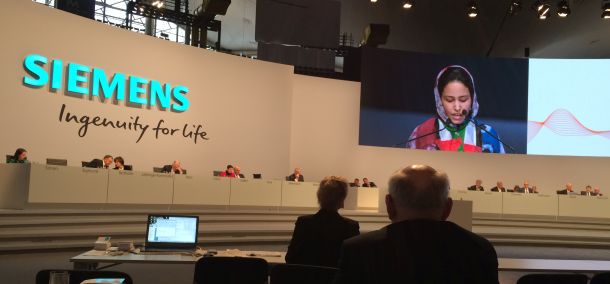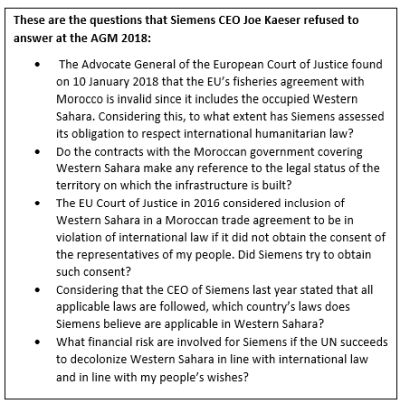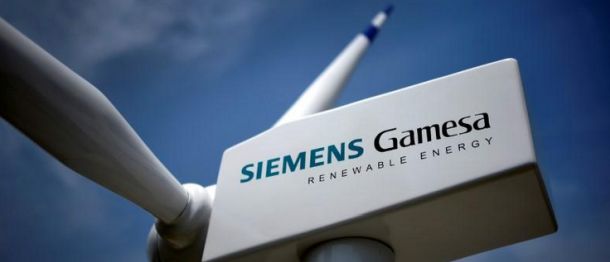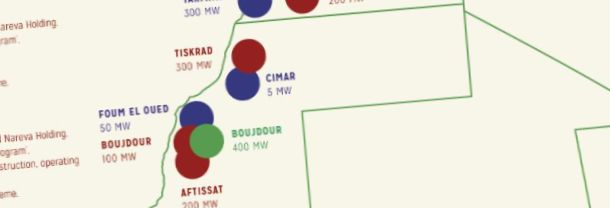
Khadja Bedati, une réfugiée du Sahara Occidental résidant actuellement en Allemagne, était parmi ceux qui ont interpellé les gestionnaires de l'entreprise. Mme Bedati est née dans les camps de réfugiés en Algérie, où vit la moitié du peuple sahraoui depuis que le Maroc a envahi le Sahara Occidental en 1975.
Khadja Bedati a posé cinq questions, aucune d'elles n'a reçu de réponse. Les questions interrogeaient principalement la façon dont siemens pouvait considérer agir dans le respect du droit international humanitaire dans le territoire occupé, en partenariat avec une société appartenant à la famille royale du Maroc, la puissance occupante. Parmi ces questions également celles restée sans réponse et à réponse hors sujet lors de l'AG de l'année précédente.
Khadja Bedati a fait référence aux conclusions de la Cour de justice de l'UE, qui a décidé le 21 décembre 2016 que l'UE ne pouvait pas avoir relations commerciales avec le Maroc pour le territoire du Sahara Occidental à moins que les représentants du peuple aient donné leur feu vert. Sans répondre à une question particulière, le PDG de Siemens s'est borné à déclarer qu '"il s'agit d'un jugement de droit international et n'affecte pas l'efficacité ou la légalité des civils ou des individus et des entreprises au Sahara Occidental".
Gilles Devers, un avocat du mouvement de libération du Sahara Occidental, le Front Polisario, estime que la réponse du PDG de Siemens montre qu'il est mal conseillé.
"Le principe est que la loi de l'ONU n'est pas directement applicable en droit interne. Mais la décision du 21 décembre 2016 a changé celle de la question du Sahara Occidental, car elle transfère les principes du droit international dans le droit européen. De cette manière, ces règles sont applicables à toutes les entreprises européennes et à tous les tribunaux européens. Le jugement est directement applicable à toutes les entreprises de l'UE opérant dans le territoire occupé", a déclaré Devers à WSRW lorsqu'il a été confronté à la réponse de Siemens.
M. Devers a expliqué qu'une procédure civile est en cours en France contre un importateur de produits agricoles du Sahara Occidental. Ce processus repose sur deux éléments : d'une part, la condition préalable du consentement de la CJUE et, d'autre part, une clarification du Polisario selon laquelle il n'a jamais donné son consentement aux importations de la société française.
Full response from Joe Kaeser, CEO of Siemens AG, 31 January 2018
“I would like to answer the questions about Western Sahara. First of all, I would like to thank you for your personal address; that you have been here and I would like to thank you for inviting me to visit you there.
I can say in advance that countries and regions and geographies that house refugees and give them a chance to live are a great achievement, a remarkable accomplishment. Siemens is also involved in such refugee camps, in the field of health, in mobile hospitals. It is a very important topic for us.
It is well known that there are five wind power projects - you have named them - which are located in an area whose international status is disputed or unclear. This is very important.
 There is a referendum demanded by the United Nations on the status of Western Sahara, you surely know that it is still outstanding.
There is a referendum demanded by the United Nations on the status of Western Sahara, you surely know that it is still outstanding.Concerning situation in Western Sahara, it is important that the territory is classified as a so-called "Non-Self-Governing Territory". We support this position. We also hope that there will soon be a peaceful and amicable solution.
As far as we know, we are investigating that, but as far as we know today, neither Siemens-Gamesa nor Siemens have contracts with the state of Morocco, but with private-sector companies that are also involved in wind power.
It is no question at all that we recognize the judgment of the European Court of Justice. But you also know that it is a judgment on international law and does not affect the effectiveness or legality of civilians or individuals and companies in Western Sahara.
We cannot say more about that now. You should know: we are sensitized. You should know that we have no intention whatsoever to break the law in any way, or even come anywhere near a breach of law. But at the moment, that's all we can say to you right now in relation to Siemens.”
Presentation by Khadja Bedati (Sahrawi Youth) at the Annual General Meeting of Siemens AG on January 31, 2018, Munich
Dear Sir or Madam,
Dear Management and Supervisory Board,
My name is Khadja Bedati. I speak for the Youth of Western Sahara and for the Association of Ethical Shareholders.
I am here to express my concern that Siemens continues to refrain from respecting the rights of the people of occupied Western Sahara and has not asked for consent to operate in our country.
Mr Kaeser, at the last Annual General Meeting, you made clear the position of Siemens: The projects in Western Sahara were "permitted under applicable law". I find this confusing.
On 10 January 2018, the General-Advocate of the Court of Justice of the EU clarified that Western Sahara is occupied by Morocco, that international humanitarian law applies, and that EUs agreement with Morocco are invalid as they include Western Sahara. Which country’s laws does Siemens believe apply to the occupied territory?
My country is located in northwest Africa between Morocco, Mauritania and Algeria. "Sahara" in Arabic means "desert", but our land offers more than drought and sand: fish-rich waters off the coast, oil, iron and gold and the second largest phosphate deposit in the world.
After the departure of the Spanish colonial masters in 1975, Western Sahara was occupied by neighboring Morocco. Many Sahrawis had to flee from the advancing army to Algeria.
During the flight, the Sahrawis were bombarded with white phosphorus and napalm.
The refugee camps are home to more than 200,000 people who are completely dependent on humanitarian aid. They suffer from the lack of economic opportunities and future prospects.
With a mined and army-tracked sandwall, the "Wall," Morocco has separated the occupied from the liberated areas of Western Sahara. At 2700 km, this wall is 16 times longer than the Berlin Wall. It is called the "wall of shame" by the Sahrawis.
Already in 1991, the UN peacekeeping force MINURSO was deployed to organize a referendum to decide on the future status of Western Sahara. The vote has been blocked by Morocco until today.
For 27 years, neither war nor peace has prevailed. The Sahrawis are waiting for a peaceful solution and feel abandoned by the international community.
In alliance with France, Rabat has even been able to prevent MINURSO being the only UN mission to have a mandate to oversee the human rights situation. Again and again, Sahrawi children, adolescents, women and elderly people in the occupied territories are abused. Torture is in the police stations and military barracks on the agenda.
No country in the world has recognized the Moroccan annexation of Western Sahara. The European Court of Justice addressed the issue of EU activities in Western Sahara in December 2016. The December ruling is clear: Western Sahara is a different territory from Morocco and must be treated separately. It was stated that Morocco has no right to conclude treaties with regard to Western Sahara without consent of Polisario, the recognized representation of the Sahrawi people
For these reasons, the Federal Government has just made it clear that it does not support the economic activities of German companies in Western Sahara via export credit and investment guarantees.
Siemens is cooperating with an energy company owned by the Moroccan king and is involved in setting up a wind farm in the occupied territories of Western Sahara. The 22 wind turbines built there supply the electricity for the extraction of phosphate and its transport from the mine to the coast, from where the raw material is exported to fertilizer producers abroad.
The value of the phosphate of three shiploads is about the same as the humanitarian aid received by the Sahrawi refugees in one year. They are the rightful owners of the raw materials. Siemens makes it possible for Morocco to empty our land of its resources.
We feel Siemens is partially responsible for our sufferings.
It is very worrying that Siemens is so clearly distancing itself from supplies to occupied Crimea, while at the same time supporting Moroccan projects in the occupied territories of Western Sahara. This suggests that Siemens has no principled position on compliance with international law.
In light of such plundering of natural resources, I call on Siemens to end projects in Western Sahara that are linked to the Moroccan government.
The climate-friendly green energy must not override human rights. Clean energy must also be produced with clean methods!
Therefore, I have the following questions:
I have one more appeal and one request to you.
The appeal: I ask you to please respond to all my questions in detail.
My request: I kindly invite you to come and visit the refugee camps and the liberated territories of Western Sahara so that you get yourself a picture about the living conditions of the people. Despite we are the legitimate owners of these resources people in the refugee camps and liberated territories are living in poorest living conditions.
Thank you for your attention.
AG Siemens : toujours pas de réponses sur le Sahara Occidental
Pour la quatrième année consécutive, Siemens la compagnie d'ingénierie allemande ne répond pas lors de son assemblée générale annuelle de son obtention du consentement du peuple du Sahara Occidental pour opérer sur ses terres.
Siemens : fournisseur des éoliennes du roi du Maroc au Sahara
WSRW a de nouveau demandé à Siemens de clarifier comment l'entreprise a obtenu l'autorisation du peuple du Sahara Occidental pour son implication dans presque tous les projets d'énergie éolienne du Maroc dans le territoire occupé.
L'énergie éolienne marocaine au Sahara Occidental occupé passerait 40%
D'autres fermes éoliennes sont prévues au Sahara Occidental occupé, et toutes sont dans le portefeuille de la compagnie du monarque marocain NAREVA.
Siemens esquive les questions sur le consentement sahraoui
Pourquoi Siemens ne cherche pas le consentement des Sahraouis pour opérer sur leurs terres ? Lors de l'assemblée annuelle des actionnaires de la Compagnie, elle n'y a pas répondu.


